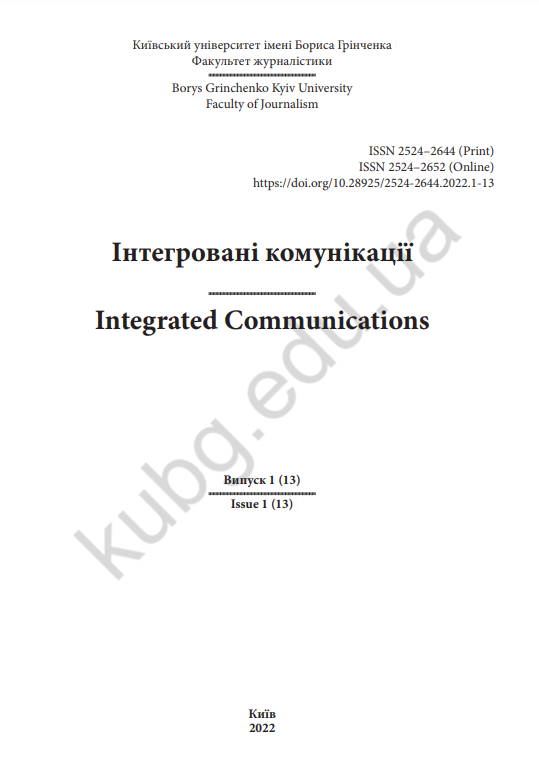Standards of Journalism and “Language of Tolerance”in the Context of Legislation and State and National Security
Abstract
The article analyses the persistent proposals from a number of journalists and media experts since 2014 to adhere to the “language of tolerance” and avoid “stylistically coloured vocabulary” for naming members of illegal armed groups, ideologues and leaders of quasi-state formations in ORDLO (SDDLR — separate districts of Donetsk and Luhansk regions; temporarily occupied territories of Ukraine) in journalistic works. According to these recommendations, the words “terrorist”, “separatist”, “bandit” were considered undesirable, especially in information genres, besides, they allegedly violated the standards of journalism, which require exclusively objective, neutral coverage of the conflict in the Donbas and the Russian-Ukrainian War. In 2022, the word “orcs” was brought to “undesirable” category in Ukrainian journalism, although the words “rashism” and “rashists” were deemed acceptable. The distinction was exceptionally subjective. The main criterion for determining desirable/undesirable words was the personal interpretation of the stylistic colouring of words,
which supposedly should be completely avoided.
The author of the article suggests that the selection of relevant lexemes should be guided primarily by the requirements of Ukrainian and foreign legislation and state-national security, which should be dominant and indisputable for journalists. In accordance with these requirements, the lexemes “terrorists”, “separatists”, “bandits” for the soldiers and officials of the temporarily occupied territories are acceptable and even mandatory for use.
In addition, considering the works of foreign and Ukrainian researchers, in particular those who defended the “language of tolerance”, the author of the article proves that emotionality, empathy, subjectivity are acceptable and even immanent features of those groups of genres that Ukrainian scientists call analytical and journalistic. Likewise, these traits are
immanent for information genres such as reportage and interviews. Therefore, emotionality and subjectivity in defending national-patriotic values and territorial integrity of the state are quite acceptable. Certain ocasional concepts and terms that originally had a metaphorical, stylistically colored character and passed into the status of well-known and generally
accepted vivid outlines of events, phenomena, persons and groups of persons are also acceptable for use in notes, reports, messages and other information genres.
Downloads
References
ABV (ABC). (2019) Zbroіnyi konflikt u terminakh (Putivnyk dlia Ukrainy) [Armed Conflict in Terms (Guide for Ukraine)]. Ed. Dutsyk D., Chernysh V., Voronina V., Riuche N., Moroz I., Paperniak O., Kalapukha I., Kyiv: Ministerstvo z pytan tymchasovo okupovanykh terytorii ta vnutrishnio peremishchenykh osib [in Ukrainian].
Andrii Kulykov rozpoviv uzhhorodskym studentam pro zhurnalistyku i propahandu v umovakh viiny (2019). [Andrii Kulykov told Uzhhorod Students about Journalism and Propaganda in the Conditions of War]. Osvitniy portal Zakarpattia — Educational portal of Transcarpathia [in Ukrainian].https://osvita.uz.ua/andrij-kulykov-rozpoviv-uzhgorodskym-studentam-pro-zhurnalistyku-j-propagandu-v-umovah-vijny/
Kulykov, Andrii (2017). «“Chervona liniia”, mozhlyvo, v tomu, shcho moi kompromisy nikoly ne buly oplacheni[“ ‘The Red Line’ May Be that My Compromises have Never Been Paid for”]. Detektor media [in Ukrainian].https://detector.media/community/article/130366/2017-09-28-andriy-kulykov-chervona-liniya-mozhlyvo-v-tomu-shcho-moi-kompromisy-nikoly-ne-buly-oplacheni/
Anies, I. (2013). Pidruchnyk iz zhurnalistyky: Pyshemo dlia hazet [Journalism Textbook: Writing for Newspapers]. Kyiv: VD «Kyievo-Mohylianska akademiia» [in Ukrainian].
Yevropeiska konventsiia z prav liudyny [European Convention on Human Rights]. [in Ukrainian]. https://zakon.rada.gov.ua/laws/ show/995_004#Text
Zhurnalistyka: slovnyk-dovidnyk (2013). [Journalism: A Dictionary-Reference]. Avt.-uklad. [editor] I. L. Mykhailyn, Kyiv: Akademvydav [in Ukrainian].
Zakon Ukrainy «Pro drukovani zasoby masovoi informatsii (presy) v Ukraini» [Law of Ukraine “On Printed Media (Press) in Ukraine”]. [in Ukrainian].https://zakon.rada.gov.ua/laws/show/2782-12#Text
Zakon Ukrainy «Pro informatsiiu» [Law of Ukraine “On Information”]. [in Ukrainian].https://zakon.rada.gov.ua/laws/show/ 2657-12#Text
Ivanov, V., & Serdiuk, V. (2006). Zhurnalistska etyka [Journalistic Ethics]. Pidruchnyk, Kyiv: Vyshcha shkola [in Ukrainian].
Ivanov, V. (2007). Standarty novynnoi zhurnalistyky [Standards of News Journalism]. Posibnyk, Kyiv: Akademiia Ukrainskoi Presy, Tsentr Vilnoi Presy [in Ukrainian].
Mikhailin, I. L. (2004). Osnovy zhurnalistiki [Fundamentals of Journalism]. Uchiebnik, Kharkov: KhIFO [in Russian].
Mizhnarodnyi pakt pro hromadianski i politychni prava [International Covenant on Civil and Political Rights]. [in Ukrainian].https://zakon.rada.gov.ua/laws/show/ 995_043#Text
Nalyvaychenko vidpoviv: «Ne perebilshuite. Nichoho strashnoho» [Nalyvaichenko replied: “Do not exaggerate. It’s okay”]. [in Ukrainian].https://gazeta.ua/articles/opinions-journal/_nalivajchenko-vidpoviv-ne-perebilshujte-nichogo-strashnogo/825620
«Ne mifichni orky, a rosiiski okupanty». Zhurnalist Andrii Kulykov — pro robotu media pid chas viiny ta protydiiu rosiiskii propahandi [“Not Mythical Orcs, but Russian Invaders.” Journalist Andrii Kulykov — about the Work of the Media during the War and Russian Propaganda]. [in Ukrainian]. https://nv.ua/ukr/ukraine/events/interv-yu-z-andriyem-kulikovim-6-chervnya-denzhurnalista-novini-ukrajini-50245622.html
Publitsystyka. Masova komunikatsiia: media-entsyklopediia. (2007). [Publicistics. Mass Communication: A media encyclopedia]. Kyiv: Akademiia Ukrainskoi Presy, Tsentr Vilnoi Presy [in Ukrainian]
Rekomendatsii Komisii z zhurnalistskoi etyky shchodo vzhyvannia stylistychno zabarvlenoi leksyky v zhurnalistskykh materialakh pro viinu [Recommendations of the Commission on Journalistic Ethics on the Use of Stylistically Coloured Vocabu-lary in Journalistic Materials about the War]. [in Ukrainian].https://cje.org.ua/statements/rekomendatsii-komisii-z-zhurnalistskoi-etyky-shchodo-vzhyvan-nia-stylistychno-zabarvlenoi-leksyky-v-zhurnalistskykh-materialakh-pro-viynu/
Rizun, V. V. (2003). Masy: texty lektsii [Masses: Texts of lectures]. Kyiv: VPTs “Kyivskyi universytet” [in Ukrainian].
Chy prynesla viina “movu vorozhnechi” v ukrainski media? EJO — Yevropeiska observatoriia zhurnalistyky [Did the War Bring “hate speech” to the Ukrainian Media?]. European Observatory of Journalism — EJO [in Ukrainian]. https://ua.ejo-online.eu/2481/etyka-ta-yakist/чи-принесла-війна-мову-ворожнечі-в-ук




